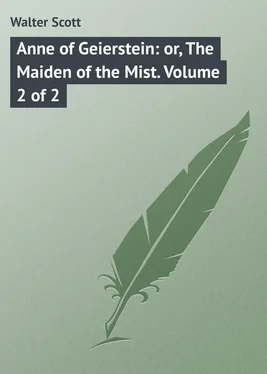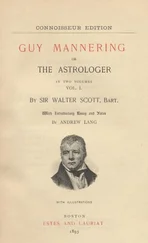Walter Scott - Anne of Geierstein - or, The Maiden of the Mist. Volume 2 of 2
Здесь есть возможность читать онлайн «Walter Scott - Anne of Geierstein - or, The Maiden of the Mist. Volume 2 of 2» — ознакомительный отрывок электронной книги совершенно бесплатно, а после прочтения отрывка купить полную версию. В некоторых случаях можно слушать аудио, скачать через торрент в формате fb2 и присутствует краткое содержание. Жанр: foreign_prose, на английском языке. Описание произведения, (предисловие) а так же отзывы посетителей доступны на портале библиотеки ЛибКат.
- Название:Anne of Geierstein: or, The Maiden of the Mist. Volume 2 of 2
- Автор:
- Жанр:
- Год:неизвестен
- ISBN:нет данных
- Рейтинг книги:4 / 5. Голосов: 1
-
Избранное:Добавить в избранное
- Отзывы:
-
Ваша оценка:
- 80
- 1
- 2
- 3
- 4
- 5
Anne of Geierstein: or, The Maiden of the Mist. Volume 2 of 2: краткое содержание, описание и аннотация
Предлагаем к чтению аннотацию, описание, краткое содержание или предисловие (зависит от того, что написал сам автор книги «Anne of Geierstein: or, The Maiden of the Mist. Volume 2 of 2»). Если вы не нашли необходимую информацию о книге — напишите в комментариях, мы постараемся отыскать её.
Anne of Geierstein: or, The Maiden of the Mist. Volume 2 of 2 — читать онлайн ознакомительный отрывок
Ниже представлен текст книги, разбитый по страницам. Система сохранения места последней прочитанной страницы, позволяет с удобством читать онлайн бесплатно книгу «Anne of Geierstein: or, The Maiden of the Mist. Volume 2 of 2», без необходимости каждый раз заново искать на чём Вы остановились. Поставьте закладку, и сможете в любой момент перейти на страницу, на которой закончили чтение.
Интервал:
Закладка:
Philipson, who was reserved and silent, both in consequence of his abstinence from the wine-pot and his unwillingness to mix in conversation with strangers, was looked upon by the landlord as a defaulter in both particulars; and as he aroused his own sluggish nature with the fiery wine, Mengs began to throw out obscure hints about kill-joy, mar-company, spoil-sport, and such like epithets, which were plainly directed against the Englishman. Philipson replied, with the utmost equanimity, that he was perfectly sensible that his spirits did not at this moment render him an agreeable member of a merry company, and that with the leave of those present he would withdraw to his sleeping-apartment, and wish them all a good evening, and continuance to their mirth.
But this very reasonable proposal, as it might have elsewhere seemed, contained in it treason against the laws of German compotation.
"Who are you," said John Mengs, "who presume to leave the table before the reckoning is called and settled? Sapperment der teufel! we are not men upon whom such an offence is to be put with impunity! You may exhibit your polite pranks in Rams-Alley if you will, or in Eastcheap, or in Smithfield; but it shall not be in John Mengs's Golden Fleece, nor will I suffer one guest to go to bed to blink out of the reckoning, and so cheat me and all the rest of my company."
Philipson looked round, to gather the sentiments of the company, but saw no encouragement to appeal to their judgment. Indeed, many of them had little judgment left to appeal to, and those who paid any attention to the matter at all were some quiet old soakers, who were already beginning to think of the reckoning, and were disposed to agree with the host in considering the English merchant as a flincher, who was determined to evade payment of what might be drunk after he left the room; so that John Mengs received the applause of the whole company, when he concluded his triumphant denunciation against Philipson.
"Yes, sir, you may withdraw if you please; but, poz element! it shall not be for this time to seek for another inn, but to the courtyard shall you go, and no farther, there to make your bed upon the stable litter; and good enough for the man that will needs be the first to break up good company."
"It is well said, my jovial host," said a rich trader from Ratisbon; "and here are some six of us – more or less – who will stand by you to maintain the good old customs of Germany; and the – umph – laudable and – and praiseworthy rules of the Golden Fleece."
"Nay, be not angry, sir," said Philipson; "yourself and your three companions, whom the good wine has multiplied into six, shall have your own way of ordering the matter; and since you will not permit me to go to bed, I trust that you will take no offence if I fall asleep in my chair."
"How say you? what think you, mine host?" said the citizen from Ratisbon; "may the gentleman, being drunk, as you see he is, since he cannot tell that three and one make six – I say, may he, being drunk, sleep in the elbow-chair?"
This question introduced a contradiction on the part of the host, who contended that three and one made four, not six; and this again produced a retort from the Ratisbon trader. Other clamours rose at the same time, and were at length with difficulty silenced by the stanzas of a chorus song of mirth and good fellowship, which the friar, now become somewhat oblivious of the rule of St. Francis, thundered forth with better good-will than he ever sang a canticle of King David. Under cover of this tumult, Philipson drew himself a little aside, and though he felt it impossible to sleep, as he had proposed, was yet enabled to escape the reproachful glances with which John Mengs distinguished all those who did not call for wine loudly, and drink it lustily. His thoughts roamed far from the stube of the Golden Fleece, and upon matter very different from that which was discussed around him, when his attention was suddenly recalled by a loud and continued knocking on the door of the hostelry.
"What have we here?" said John Mengs, his nose reddening with very indignation; "who the foul fiend presses on the Golden Fleece at such an hour, as if he thundered at the door of a bordel? To the turret window some one – Geoffrey, knave ostler, or thou, old Timothy, tell the rash man there is no admittance into the Golden Fleece save at timeous hours."
The men went as they were directed, and might be heard in the stube vying with each other in the positive denial which they gave to the ill-fated guest who was pressing for admission. They returned, however, to inform their master, that they were unable to overcome the obstinacy of the stranger, who refused positively to depart until he had an interview with Mengs himself.
Wroth was the master of the Golden Fleece at this ill-omened pertinacity, and his indignation extended, like a fiery exhalation, from his nose, all over the adjacent regions of his cheeks and brow. He started from his chair, grasped in his hand a stout stick, which seemed his ordinary sceptre or leading staff of command, and muttering something concerning cudgels for the shoulders of fools, and pitchers of fair or foul water for the drenching of their ears, he marched off to the window which looked into the court, and left his guests nodding, winking, and whispering to each other, in full expectation of hearing the active demonstrations of his wrath. It happened otherwise, however; for, after the exchange of a few indistinct words, they were astonished when they heard the noise of the unbolting and unbarring of the gates of the inn, and presently after the footsteps of men upon the stairs; and the landlord entering, with an appearance of clumsy courtesy, prayed those assembled to make room for an honoured guest, who came, though late, to add to their numbers. A tall dark form followed, muffled in a travelling-cloak; on laying aside which, Philipson at once recognised his late fellow-traveller, the Black Priest of St. Paul's.
There was in the circumstance itself nothing at all surprising, since it was natural that a landlord, however coarse and insolent to ordinary guests, might yet show deference to an ecclesiastic, whether from his rank in the Church or from his reputation for sanctity. But what did appear surprising to Philipson was the effect produced by the entrance of this unexpected guest. He seated himself, without hesitation, at the highest place of the board, from which John Mengs had dethroned the aforesaid trader from Ratisbon, notwithstanding his zeal for ancient German customs, his steady adherence and loyalty to the Golden Fleece, and his propensity to brimming goblets. The priest took instant and unscrupulous possession of his seat of honour, after some negligent reply to the host's unwonted courtesy; when it seemed that the effect of his long black vestments, in place of the slashed and flounced coat of his predecessor, as well as of the cold grey eye with which he slowly reviewed the company, in some degree resembled that of the fabulous Gorgon, and if it did not literally convert those who looked upon it into stone, there was yet something petrifying in the steady unmoved glance with which he seemed to survey them, looking as if desirous of reading their very inmost souls, and passing from one to another, as if each upon whom he looked in succession was unworthy of longer consideration.
Philipson felt, in his turn, that momentary examination, in which, however, there mingled nothing that seemed to convey recognition. All the courage and composure of the Englishman could not prevent an unpleasant feeling while under this mysterious man's eye, so that he felt a relief when it passed from him and rested upon another of the company, who seemed in turn to acknowledge the chilling effects of that freezing glance. The noise of intoxicated mirth and drunken disputation, the clamorous argument, and the still more boisterous laugh, which had been suspended on the priest's entering the eating-apartment, now, after one or two vain attempts to resume them, died away, as if the feast had been changed to a funeral, and the jovial guests had been at once converted into the lugubrious mutes who attend on such solemnities. One little rosy-faced man, who afterwards proved to be a tailor from Augsburg, ambitious, perhaps, of showing a degree of courage not usually supposed consistent with his effeminate trade, made a bold effort; and yet it was with a timid and restrained voice that he called on the jovial friar to renew his song. But whether it was that he did not dare to venture on an uncanonical pastime in presence of a brother in orders, or whether he had some other reason for declining the invitation, the merry churchman hung his head, and shook it with such an expressive air of melancholy, that the tailor drew back as if he had been detected in cabbaging from a cardinal's robes, or cribbing the lace of some cope or altar gown. In short, the revel was hushed into deep silence, and so attentive were the company to what should arrive next, that the bells of the village church, striking the first hour after midnight, made the guests start as if they heard them rung backwards, to announce an assault or conflagration. The Black Priest, who had taken some slight and hasty repast, which the host had made no kind of objection to supplying him with, seemed to think the bells, which announced the service of lauds, being the first after midnight, a proper signal for breaking up the party.
Читать дальшеИнтервал:
Закладка:
Похожие книги на «Anne of Geierstein: or, The Maiden of the Mist. Volume 2 of 2»
Представляем Вашему вниманию похожие книги на «Anne of Geierstein: or, The Maiden of the Mist. Volume 2 of 2» списком для выбора. Мы отобрали схожую по названию и смыслу литературу в надежде предоставить читателям больше вариантов отыскать новые, интересные, ещё непрочитанные произведения.
Обсуждение, отзывы о книге «Anne of Geierstein: or, The Maiden of the Mist. Volume 2 of 2» и просто собственные мнения читателей. Оставьте ваши комментарии, напишите, что Вы думаете о произведении, его смысле или главных героях. Укажите что конкретно понравилось, а что нет, и почему Вы так считаете.












